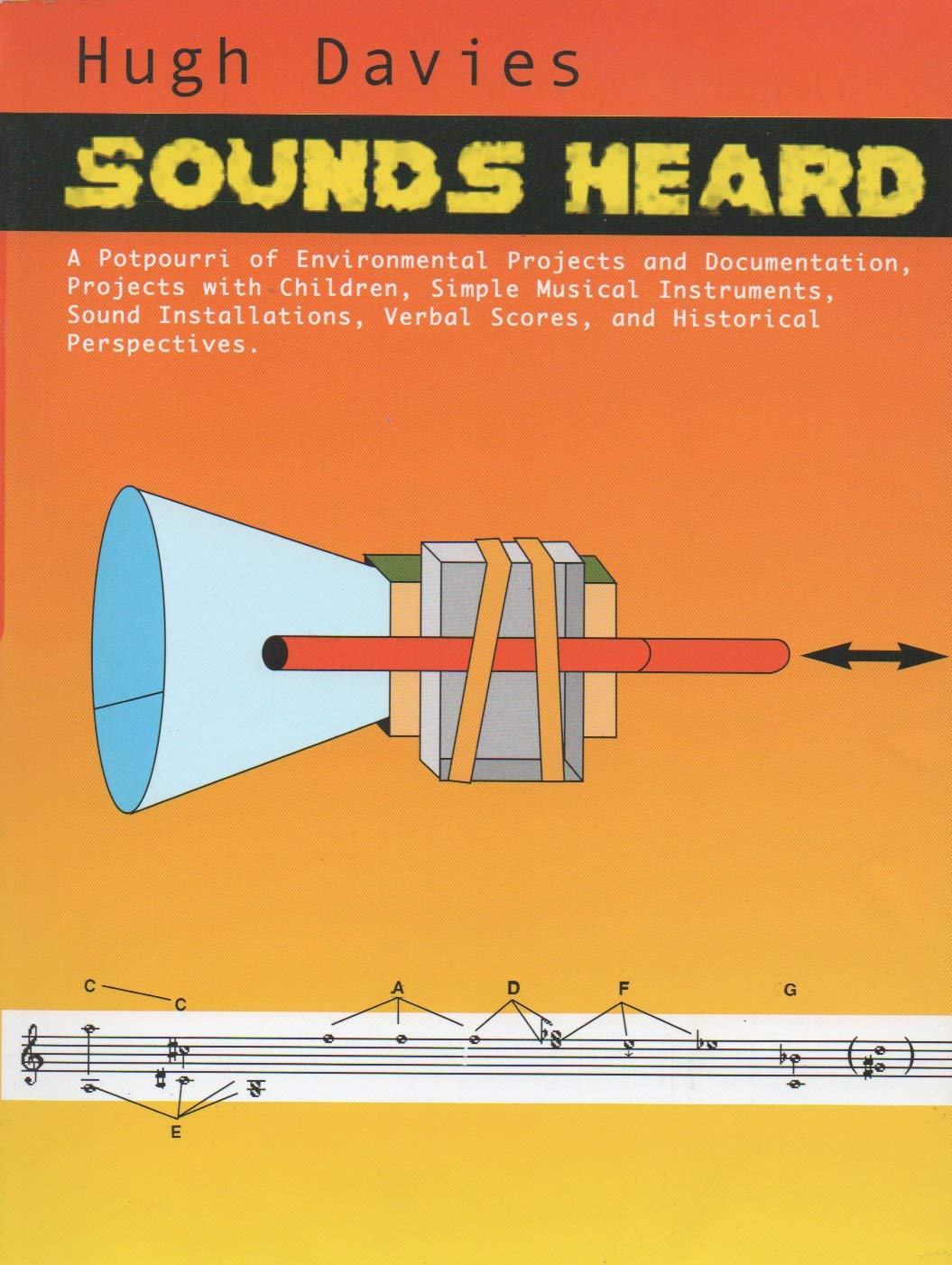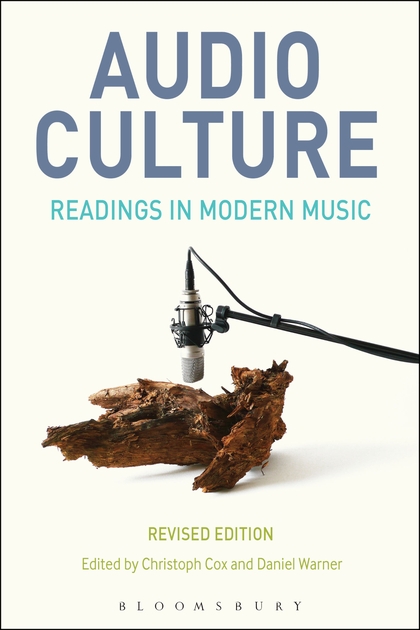Hugh Davies: Sounds Heard: A Potpourri of Environmental Projects and Documentation, Projects with Children, Simple Musical Instruments, Sound Installations, Verbal Scores, and Historical Perspectives (2002)
Filed under sound recording | Tags: · composition, electronic music, environment, experimental music, improvised music, music, music criticism, musical instruments, sound, sound art

“Sounds Heard is not only a collection of writings intended for people who are interested or involved in contemporary music, especially those performers – including children – who lack a formal musical training. It also charts a wide cross-section of the activities of an intriguing musical personality. At different times in Hugh Davies’ nearly 40 year career he has been variously described as “the world’s leading electromusicologist”, “the most informed person around on the general subject of new instruments”, “unique English composer”, “one of the most interesting instrument inventors of recent decades”, “the remarkable live-electronics ‘freak”‘, an “electronic wizard”, “a humanist” and “I have never seen any music teacher who is as fond of children as he is”. Do these really refer to only one person? Who is the real Hugh Davies? Why has his modesty prevented him from being better known?
This book focuses on many of Davies’ insights about working as an artist, a musician, a composer, a performer, an instrument inventor, an educator and a researcher. He takes nothing for granted, and there are always wider implications than his own immediate involvement. Even his more avantgarde scenarios are tempered with his “very British sense of humour”. Many of the different areas of experimental music since the 1960s are touched on, including electronic music, live electronics, invented instruments, sound sculpture, sound installations and free improvisation, in all of which he was one of the British pioneers.
The CD illustrates a cross-section of the themes covered in the book. As with most of Hugh Davies’ solo performances and recordings, no conventional instruments were used on the entire album, with the exception of one short piece in which existing music has been manipulated with tape techniques.” (from back cover)
Publisher Soundworld Publishers, Chelmsford, 2002
ISBN 1902440056, 9781902440057
124 pages
PDF (29 MB)
Selections from accompanying CD
Christoph Cox, Daniel Warner (eds.): Audio Culture: Readings in Modern Music (2004/2017)
Filed under book | Tags: · composing, composition, djs, electroacoustic music, electronic music, experimental music, improvised music, listening, minimal music, music, music criticism, music history, music theory, musique concrète, noise, silence, sound

“Audio Culture maps the aural and discursive terrain of vanguard music today. Rather than offering a history of contemporary music, the book traces the genealogy of current musical practices and theoretical concerns, drawing lines of connection between recent musical production and earlier moments of sonic experimentation. It aims to foreground the various rewirings of musical composition and performance that have taken place in the past few decades and to provide a critical and theoretical language for this new audio culture.
Via writings by philosophers, cultural theorists, and composers, Audio Culture explores the interconnections among such forms as minimalism, indeterminacy, musique concrète, free improvisation, experimental music, avant-rock, dub reggae, ambient music, hip hop, and techno. Instead of focusing on the putative “crossover” between “high art” and “popular culture,” Audio Culture takes all of these musics as experimental practices on par with, and linked to, one another.
Audio Culture includes writing by some of the most important musical thinkers of the past half-century, among them John Cage, Brian Eno, Glenn Gould, Umberto Eco, Ornette Coleman, Jacques Attali, Simon Reynolds, Pauline Oliveros, Paul D. Miller, David Toop, John Zorn, Karlheinz Stockhausen, and many others. The book is divided into nine thematically-organized sections, each with its own introduction.”
Publisher Continuum, September 2004
Second, revised edition, Bloomsbury, 2017
ISBN 9781501318351, 1501318357
xviii+646 pages
Reviews: Ian Whalley (Computer Music Journal, 2005), Christopher DeLaurenti (eContact!, 2006), Dene Grigar (Leonardo, 2005), Clemens Gresser (Tempo, 2005), Gregory Taylor (Cycling74, 2018).
PDF, PDF (updated on 2021-2-6)
EPUB, EPUB (updated on 2021-2-6)
David Novak: Japanoise: Music at the Edge of Circulation (2013)
Filed under book | Tags: · aesthetics, ethnomusicology, feedback, improvised music, japan, listening, music, music criticism, music history, musicology, noise, performance, technology

“Noise, an underground music made through an amalgam of feedback, distortion, and electronic effects, first emerged as a genre in the 1980s, circulating on cassette tapes traded between fans in Japan, Europe, and North America. With its cultivated obscurity, ear-shattering sound, and over-the-top performances, Noise has captured the imagination of a small but passionate transnational audience.
For its scattered listeners, Noise always seems to be new and to come from somewhere else: in North America, it was called ‘Japanoise.’ But does Noise really belong to Japan? Is it even music at all? And why has Noise become such a compelling metaphor for the complexities of globalization and participatory media at the turn of the millennium?
In Japanoise, David Novak draws on more than a decade of research in Japan and the United States to trace the ‘cultural feedback’ that generates and sustains Noise. He provides a rich ethnographic account of live performances, the circulation of recordings, and the lives and creative practices of musicians and listeners. He explores the technologies of Noise and the productive distortions of its networks. Capturing the textures of feedback—its sonic and cultural layers and vibrations—Novak describes musical circulation through sound and listening, recording and performance, international exchange, and the social interpretations of media.”
Publisher Duke University Press, Durham, 2013
Sign, Storage, Transmission series
Creative Commons BY-NC-ND 3.0 License
ISBN 9780822353799, 0822353792
x+292 pages
via author
Reviews: Shaun McKenna (Japan Times, 2013), Scott McLemee (Inside Higher Ed, 2013), Nana Kaneko (Ethnomusicology Rev, 2014), Andrés García Molina (Current Musicology, 2014), Max Ritts (Society+Space, 2014), Jonathan Service (Japan Forum, 2014), Rosemary Overell (Perfect Beat, 2014), Patrick Valiquet (Popular Musicology, 2014), Owen Coggins (Harts & Minds, 2014), Seth Mulliken (Sounding Out!, 2014), E. Taylor Atkins (Asian Music, 2015), Shelina Brown (Notes, 2015), Jennifer Milioto Matsue (Am Anthropologist, 2015), Carolyn S. Stevens (Am Ethnologist, 2015), Christopher Tonelli (Sound Studies, 2016), Benjamin Harley (Enculturation, 2016), Etienne RP (2017).
Book website, with supplemental media
Publisher
WorldCat

